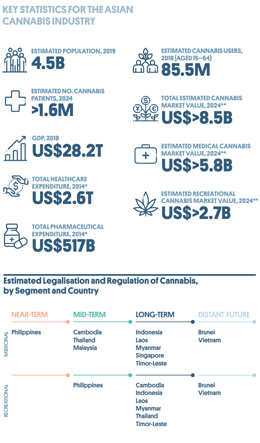Three tiers of cannabis reform in Asia

The past 24 months have seen significant developments in the legislation surrounding medicinal cannabis in Asia. The inaugural issue of The Asian Cannabis Report by Prohibition Partners categorized three tiers of Cannabis reform in Asia as follows:
LEADING THE WAY
No single sub-region of Asia appears to be leading the way on cannabis reform, although Western Asia appears somewhat more progressive in that a number of countries have scheduled or intend to schedule the decriminalisation of cannabis. Although there was competition between Thailand, South Korea and Malaysia to see who would be the first country to legalise cannabis for medical and research purposes, legal progress is not unified in the region. Only Israel has already legalised medical cannabis and decriminalised recreational cannabis.
POISED TO MOVE
Georgia, Israel and Turkey possess progressive medicinal cannabis legislation. While recreational cannabis remains illegal across much of Asia, it has either been decriminalised or is quietly tolerated in several nations, including Afghanistan, Bangladesh, Armenia and Lebanon.
Developments are anticipated in a number of southern and southeastern countries. Singapore is expected to follow the example of Thailand and South Korea by allowing the use of medicinal
products containing cannabinoids. In addition, the Indian government and the Philippine government are independently debating whether to legalise medical cannabis. Sri Lanka has launched its first plantation for domestic medical use and for exports to the US.
NOT YET READY FOR CHANGE
Central Asian countries (Kazakhstan, Kyrgyzstan, Tajikistan, Turkmenistan and Uzbekistan), in particular, are unlikely to move towards either medicinal or recreational cannabis legalisation over the forecast period to 2024. Western Asia’s Arabian countries, most notably Bahrain, Iraq, Kuwait, Qatar and Saudi Arabia, have similarly not shown any signs of progress on the issue.
China is also unlikely to fully legalise cannabis in the next 5–10 years. Despite widespread use of cannabis amongst locals, China’s authorities continue to view the drug in anti-social terms.
Its neighbour to the west, Vietnam, has extremely oppressive antidrug policies that are unlikely to change in the foreseeable future.
http://www.asianpacificpost.com/media/graphics/stats%20cannabis.pdf
http://www.asianpacificpost.com/media/graphics/grapg%202.pdf









